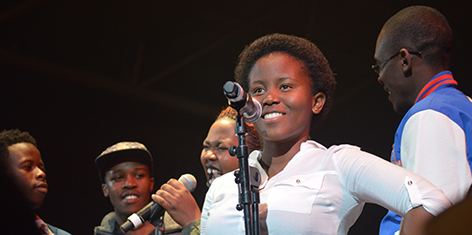Latest News Archive
Please select Category, Year, and then Month to display items
08 April 2021
|
Story Thabo Kessah
|
Photo UFS Photo Archive
 Dr KPD Maphalla with former UFS Chancellor, Dr Franklin Sonn, during the graduations in April 2007.
Dr KPD Maphalla with former UFS Chancellor, Dr Franklin Sonn, during the graduations in April 2007.
The University of the Free State is sad to learn of the passing of alumnus and award-winning Sesotho literary giant, Dr KPD Maphalla.
The literary works of Dr Khotso Pieter David Maphalla, like many other African writers and artists, were influenced and characterised by his own era of powerful forms of oppression and exclusion from dominant literary discourses. In his own right and through his writings of poetry, novels, short stories, and kodiamalla (dirge), he articulated a deliberate political and social protest and pushed for a place for African languages in literature at the height of apartheid.
“He entered the professional scene with his ground-breaking novel, Kabelwamanong, in 1982 at the age of 27. His career actually started in 1971 while he was still at school. Since his first novel, he has produced at least two books annually, covering the genres of poetry, novels, dramas, and short stories. As a dramatist, Dr Maphalla has written a number of excellent and educative radio dramas for the then Radio Sesotho (now Lesedi FM),” said his long-time friend and Head: African Languages at the University of the Free State, Dr Nyefolo Malete.
“It was for this writing prowess that he received recognition from the UFS when he was awarded an Honorary Doctorate in Literature by the Department of African Languages during a momentous ceremony on the Qwaqwa Campus in 2007,” added Dr Malete.
Dr Malete also revealed that, despite losing the use of his right hand after suffering a stroke following a car accident in the late 1990s, Dr Maphalla continued writing using his left hand. “He was adamant that, what he referred to as his ‘supposed disability’, would not deter his passion for writing.”
Dr Maphalla’s work has also produced numerous scholarly studies by the likes of Profs Moleleki Moleleki (protest poetry), Thapelo Selepe (lament and protest poetry), and Dr Seema Seema (process of cross-cultural communication). He was a committed Qwaqwa community member, who was also instrumental in the founding of Qwaqwa Community Radio (2000) and Metjodi Writers (2006), among others. He has written more than 70 books, many of which have been prescribed texts in schools.
Some of the awards he has won include:
South African Centre for Digital Language Resource (SADiLar) Sesotho Lexicographic Unit (Sesiu sa Sesotho) Lifetime Award for outstanding literary works and for promoting Sesotho literature (2019).
The Literature Festival and the University of the Free State Award for enormous contribution to Sesotho literature by a South African writer (2019).
Lifetime Achiever Award in Literature awarded by the Department of Arts and Culture (2005).
M-Net Book Prize for Sesotho poetry (2005). The first and thus far the only Sesotho author to have received this honour.
M-Net Book Prize for best novel (1996).
De Jager-HAUM Literary Award for his volume of short stories, Mohlomong Hosane (1993).
Thomas Mofolo Trophy for Best Novel, Best Poetry, and the Overall Award (1992).
Thomas Mofolo Trophy for Best Poetry (1991).
Dr JJ Moiloa Floating Trophy for Best Sesotho Poetry Book of the Year, Kgapa tsa ka (1985).
I-DENT-I-TIES tackles identity in an unusual story-telling style
2016-07-26
 One of the leading performers, Baanetse Mokhotla.
One of the leading performers, Baanetse Mokhotla.
Photo: Thabo Kessah
The I-DENT-I-TIES project has been an enormous experience for the Qwaqwa Campus students who were part of this large-scale interdisciplinary performance project. This is according to Baanetse Mokhotla, one of the leading performers.
“I have personally learnt a lot about performing arts and also grew as an individual,” Baanetse said about the production that was part of this year’s Vrystaat Arts Festival in Bloemfontein.
This massive interactive production of the 54-member student cast utilises music, song and dance in an unusual method of story-telling. It uses live video camera feeds on two big screens as well as recorded video clips of the cast itself and members of the community, some of whom were part of the audience during the two shows staged on the Qwaqwa Campus. The cast intermittently mingles with the audience, thus allowing the latter to be part of the narrative as well.
The main story line explores issues around identity while using the famous Basotho story of ‘Moshanyana Sankatana’ as a catalyst.
Two of the capturing features are the live interviews and the narration of the animated ‘Moshanyana Sankatana’ story, creating stories within a story.
Commenting about the project, SRC President Paseka Sikhosana said that he was happy to have led the student community during this proud moment.
“I loved how this show has exposed our enormously talented performers to the world. It was magical and we need more of such to ensure there will never be a dull moment on our campus,” he said.
Sociology lecturer Sivuyisiwe Magayana said: “I-DENT-I-TIES production was fresh fun. It exhibited the fact that we should be appreciative of other's differences. It also emphasised that we should move away from subscribing to an 'in-group' and 'out-group' mentality when it comes to issues of race, sexuality and identity.”
The international creative team behind this project included a New York-based Dutch director, Erwin Maas; Vienna-based Dutch theatre designer, Nico de Rooij; Djana Covic, a Serbian performance-craft-artist based in Vienna; and South African film and stage legend Jerry Mofokeng.